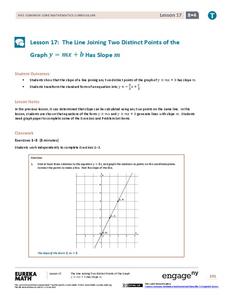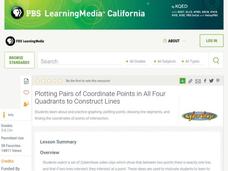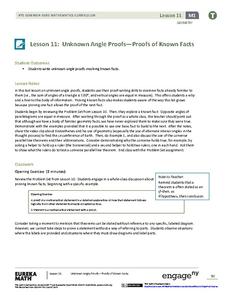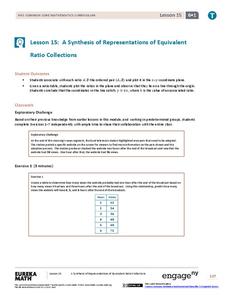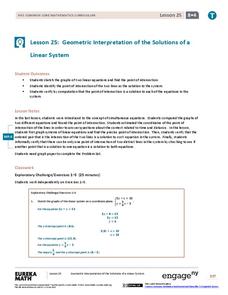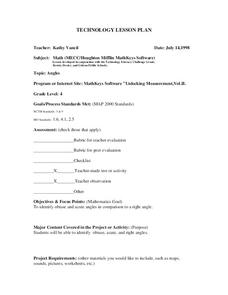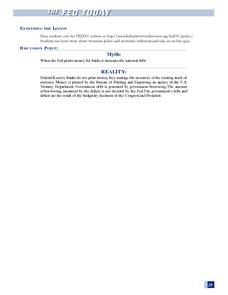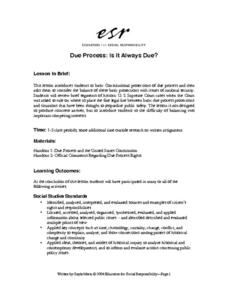EngageNY
The Line Joining Two Distinct Points of the Graph y=mx+b Has Slope m
Investigate the relationship between the slope-intercept form and the slope of the graph. The lesson plan leads an investigation of the slope-intercept equation of a line and its slope. Pupils realize the slope is the same as the...
EngageNY
From Ratio Tables, Equations and Double Number Line Diagrams to Plots on the Coordinate Plane
Represent ratios using a variety of methods. Classmates combine the representations of ratios previously learned with the coordinate plane. Using ratio tables, equations, double number lines, and ordered pairs to represent...
EngageNY
Characteristics of Parallel Lines
Systems of parallel lines have no solution. Pupils work examples to discover that lines with the same slope and different y-intercepts are parallel. The 27th segment of 33 uses this discovery to develop a proof, and the class determines...
EngageNY
The Graph of a Linear Equation in Two Variables Is a Line
Show your class that linear equations produce graphs of lines. The 20th segment in a unit of 33 provides proof that the graph of a two-variable linear equation is a line. Scholars graph linear equations using two points, either from...
PBS
Plotting Pairs of Coordinate Points in All Four Quadrants to Construct Lines
Your young graphers are motivated by watching three Cyberchase videos to plot points in all four quadrants, connect pairs of points to make a line segment, and find the point of intersection of two lines.
EngageNY
Fundamental Theorem of Similarity (FTS)
How do dilated line segments relate? Lead the class in an activity to determine the relationship between line segments and their dilated images. In the fourth section in a unit of 16, pupils discover the dilated line...
Geometry Accelerated
Accelerated Geometry Review Sheet
Your geometry learners use their knowledge of various geometric concepts to write proofs. Starting with givens containing parallel line segments with transversals and triangles and quadrilaterals, and the mid-point and distance formulas;...
Illustrative Mathematics
Points equidistant from two points in the plane
Young geometers apply their deductive reasoning skills and knowledge of proving triangles congruent in a task that asks them to prove if a point lies on the perpendicular bisector of a segment, then it is equidistant from the endpoints...
EngageNY
Finding One Hundred Percent Given Another Percent
Class members solve problems to find the whole when given a percent. They use double line numbers and factors of hundred to help break the 100 percent into equal segments.
EngageNY
Distance and Complex Numbers 2
Classmates apply midpoint concepts by leapfrogging around the complex plane. The 12th lesson in a 32 segment unit, asks pupils to apply distances and midpoints in relationship to two complex numbers. The class develops a formula to find...
EngageNY
Unknown Angle Proofs—Proofs of Known Facts
Lead the class in a Greek history lesson with a geometric twist. Pupils relate a short video about geometric properties to modern-day methods of solving for unknown angles. They discuss parallel line theorems and complete...
Curated OER
Transformations in the Coordinate Plane
Your learners connect the new concepts of transformations in the coordinate plane to their previous knowledge using the solid vocabulary development in this unit. Like a foreign language, mathematics has its own set of vocabulary terms...
EngageNY
A Synthesis of Representations of Equivalent Ratio Collections
Make all the ratio representations fit together. The 15th segment in a series of 29 presents ratio problems to solve. Scholars use a variety of representations to respond to the questions. The problem set has pupils show how the...
EngageNY
Geometric Interpretations of the Solutions of a Linear System
An intersection is more than just the point where lines intersect; explain this and the meaning of the intersection to your class. The 26th segment in a 33-part series uses graphing to solve systems of equations. Pupils graph linear...
EngageNY
Complex Numbers as Vectors
Show your math class how to use vectors in adding complex numbers. Vectors represent complex numbers as opposed to points in the coordinate plane. The class uses the geometric representation to add and subtract complex numbers and...
EngageNY
Complex Numbers and Transformations
Your learners combine their knowledge of real and imaginary numbers and matrices in an activity containing thirty lessons, two assessments (mid-module and end module), and their corresponding rubrics. Centered on complex numbers and...
Curated OER
Circumcenter of a Triangle
Your geometry learners will discover and show the construction of the circumcenter of a triangle. Guided by the steps in the activity, they construct perpendicular bisectors of each side that have a point of concurrency called the...
Curated OER
Angles
Learners identify obtuse and acute angles in comparsion to a right angle. They identify obtuse, acute, and right angles. Pupils use "Shape Measure" to construct obtuse, acute, and right angles. They review line segements to locate right...
EngageNY
Construct a Perpendicular Bisector
How hard can it be to split something in half? Learners investigate how previously learned concepts from angle bisectors can be used to develop ways to construct perpendicular bisectors. The resource also covers constructing a...
Federal Reserve Bank
The Fed's Role in Making and Setting Monetary Policy: Part 2
How does the Federal Open Market Committee work to formulate the nation's monetary policy in the United States? As the second segment of a lesson on the role of the Fed in setting monetary policy, class members will learn about open...
EngageNY
Creating a Dot Plot
Which dot am I? Pupils create dot plots to represent sample data through the use of frequency tables. The third segment in a series of 22 asks individuals to analyze the dot plots they created. The scholars translate back and...
Curated OER
Reflections
Fifth graders create a reflection of a poygon using a Mira. They discover that a line connecting a vertiex of a polygon and the corresponding vertex of its reflection is perpendicular to the line of reflection. Students create a glide...
Curated OER
Due Process: Is It Always Due?
Students explore the basic Constitutional protections of due process and then consider the balance of these basic protections with issues of national security. A variety of segments of U.S. Supreme Court cases are examined in this...
Curated OER
Taxi!
Your young taxi drivers evaluate and articulate the reasoning behind statements in a conceptual task involving linear data. The given data table of distances traveled and the resulting fare in dollars is used by learners to explore...
Other popular searches
- Lines, Points, Line Segments
- Lines Points Line Segments
- Points Line Segments Rays
- Points Lines Segments and Rays
